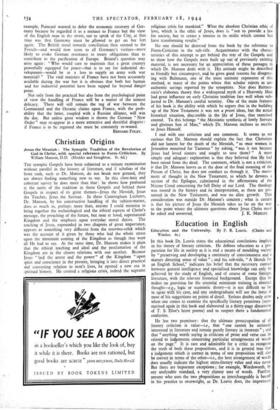Christian Origins
THE synoptic Gospels have been subjected to a minute examination without parallel in the history of literature, and if scholm of the front rank, such as Dr. Manson, do not break new ground, they are always finding something new to say. In this close-knit and coherent survey he does more than that : he shows how profound is the unity of the tradition in those Gospels and behind those Gospels in respect of its great themes—Jesus the Messiah, Jesus the Teacher, Jesus the Saviour. In these Cunningham Lectures, Dr. Manson, by his constructive handling of the subject-matter, does as much as, perhaps more than, anyone I could mention to bring together the eschatological and the ethical aspects of Christ's message, the preaching of the future, but near at hand, supernatural Kingdom and the emphasis upon everyday moral duties. The teaching of Jesus, expounded in two chapters of great importance, appears as something very different from the interims-ethik which was the account of it given by those who laid the whole stress upon the imminent coming of the Kingdom as though that were all He had to say. At the same time, Dr. Manson makes it plain that the ethical teaching and ideal and the proclamation of the Kingdom are in the closest relations with one another. Because Jesus "laid the arrest and the power" of the Kingdom "upon ;pirit and conscience in the present, bringing it into direct practical trid converting relation to men's lives, he opened a new era in piritual history. He created a religious crisis, indeed the supreme
religious crisis for mankind." What the absolute Christian ethic of love, which is the ethic of Jesus, does is "not to provide a law for society, but to create a tension in its midst which cannot but have transforming results."
No one should be deterred from the book by the reference to Form-Criticism in the sub-title. Acquaintance with the charac- teristics of this attempt to get behind the text of the Gospels and to show how the Gospels were built up out' of previously existing material, is not necessary for an appreciation of those passages in which Dr. Manson deals with it. His attitude might be described as friendly but circumspect, and he gives good reasons for disagree- ing with Bultmann, one of the most eminent exponents of this method, at many of the points where that scholar rejects as un- authentic sayings reported by the synoptists. Nor does Reitzen- stein's elaborate theory that a widespread myth of a Heavenly Man had great influence on early Christian tradition fare well when sub- jected to Dr. Manson's careful scrutiny. One of the main features of his book is the ability with which he argues that in the building up of the New Testament it was not a priori ideas, but the actual historical situation, discernible in the life of Jesus, that exercised control. To this belongs "the Messianic synthesis of lowly Servant and glorious Son of Mast," which Dr. Manson inclines to ascribe to Jesus Himself.
I end with one criticism and one comment. It seems to me curious that Dr. Manson should explain the fact that Christians did not lament for the death of the Messiah, "as once women in Jerusalem mourned for Tammuz" by asking, "was it not because Jesus had loved sinners and sought to save them? " A more simple and adequate explanation is that they believed that He had been raised from the dead. The comment, which is not a criticism, is: that Dr. Manson leaves us at the door of the final meaning of the Person of Christ, but does not conduct us through it. The move- ment of thought in the New Testament, to which he devotes a section of the Epilogue, culminated in the affirmations of the Nicene Creed concerning the full Deity of our Lord. The theology was rooted in the history and its interpretation, as these are pre- sented in the New Testament, and was no alien growth. This consideration was outside Dr. Manson's concern ; what is certain is that his picture of Jesus the Messiah takes us far on the way to the point where the ultimate questions about Jesus Christ mus


























 Previous page
Previous page